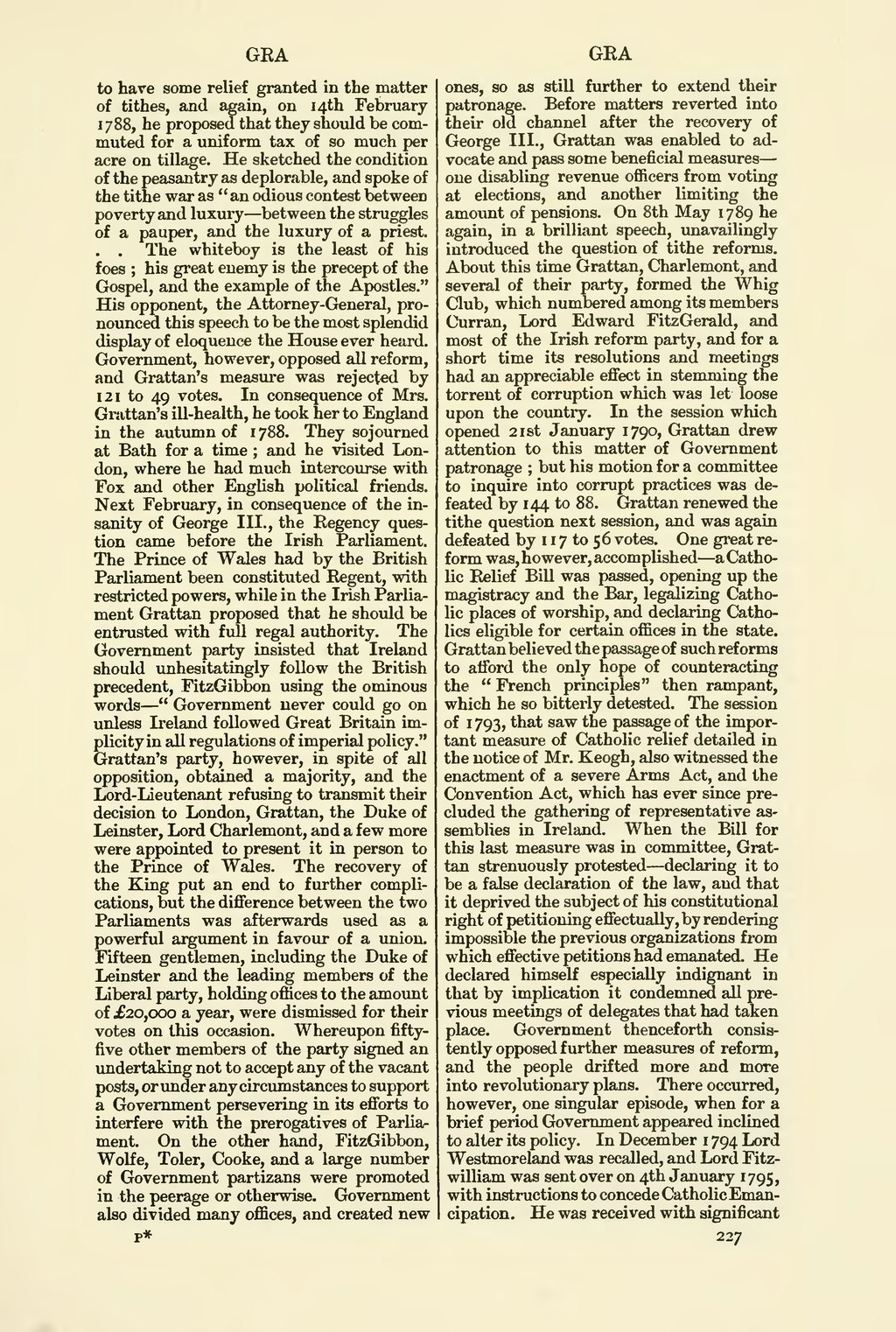GEA
to have some relief granted in the matter of tithes, and again, on 14th February 1788, he proposed that they should be com- muted for a uniform tax of so much per acre on tillage. He sketched the condition of the peasantry as deplorable, and spoke of the tithe war as "an odious contest between poverty and luxury — between the struggles of a pauper, and the luxury of a priest. . . The whiteboy is the least of his foes ; his great enemy is the precept of the Gospel, and the example of the Apostles." His opponent, the Attorney-General, pro- nounced this speech to be the most splendid display of eloquence the House ever heard. Government, however, opposed all reform, and Grattan's measui-e was rejected by 121 to 49 votes. In consequence of Mrs. Grattan's ill-health, he took her to England in the autumn of 1 788. They sojourned at Bath for a time ; and he visited Lon- don, where he had much intercourse with Fox and other English political friends. Next February, in consequence of the in- sanity of George III., the Kegency ques- tion came before the Irish Parliament. The Prince of Wales had by the British Parliament been constituted Regent, with restricted powers, while in the Irish Parlia- ment Grattan proposed that he should be entrusted with full regal authority. The Government party insisted that Ireland should unhesitatingly follow the British precedent, FitzGibbon using the ominous words — " Government never could go on unless Ireland followed Great Britain im- plicity in all regulations of imperial policy." Grattan's party, however, in spite of all opposition, obtained a majority, and the Lord-Lieutenant refusing to transmit their decision to London, Grattan, the Duke of Leinster, Lord Charlemont, and a few more were appointed to present it in person to the Prince of "Wales. The recovery of the King put an end to further compli- cations, but the difference between the two Parliaments was afterwards used as a powerful argument in favour of a union. Fifteen gentlemen, including the Duke of Leinster and the leading members of the Liberal party, holding offices to the amount of .£20,(X)o a year, were dismissed for their votes on this occasion. Whereupon fifty- five other members of the party signed an undertaking not to accept any of the vacant posts, or under any circumstances to support a Government persevering in its efforts to interfere with the prerogatives of Parlia- ment. On the other hand, FitzGibbon, Wolfe, Toler, Cooke, and a large number of Government partizans were promoted in the peerage or otherwise. Government also divided many offices, and created new p*
GEA
ones, so as still further to extend their patronage. Before matters reverted into their old channel after the recovery of George III., Grattan was enabled to ad- vocate and pass some beneficial measures — one disabling revenue officers from voting at elections, and another limiting the amount of pensions. On 8th May 1789 he again, in a brilliant speech, unavailingly introduced the question of tithe reforms. About this time Grattan, Charlemont, and several of their party, formed the Whig Club, which numbered among its members Curran, Lord Edward FitzGerald, and most of the Irish reform party, and for a short time its resolutions and meetings had an appreciable effect in stemming the torrent of corruption which was let loose upon the country. In the session which opened 21st January 1790, Grattan drew attention to this matter of Government patronage ; but his motion for a committee to inquire into corrupt practices was de- feated by 144 to 88. Grattan renewed the tithe question next session, and was again defeated by 1 1 7 to 56 votes. One great re- form was, however, accomplished — a Catho- lic Relief Bill was passed, opening up the magistracy and the Bar, legalizing Catho- lic places of worship, and declaring Catho- lics eligible for certain offices in the state. Grattan belie ved the passage of such reforms to afford the only hope of counteracting the " French principles" then rampant, which he so bitterly detested. The session of 1 793, that saw the passage of the impor- tant measure of Catholic relief detailed in the notice of Mr. Keogh, also witnessed the enactment of a severe Arms Act, and the Convention Act, which has ever since pre- cluded the gathering of representative as- semblies in Ireland. When the Bill for this last measure was in committee, Grat- tan strenuously protested — declaring it to be a false declaration of the law, and that it deprived the subject of his constitutional right of petitioning effectually, by rendering impossible the previous organizations from which effective petitions had emanated. He declared himself especially indignant in that by implication it condemned all pre- vious meetings of delegates that had taken place. Government thenceforth consis- tently opposed further measures of reform, and the people drifted more and more into revolutionary plans. There occurred, however, one singular episode, when for a brief period Government appeared inclined to alter its policy. In December 1 794 Lord Westmoreland was recalled, and Lord Fitz- william was sent over on 4th January 1795, with instructions to concede Catholic Eman- cipation, He was received with significant 227
